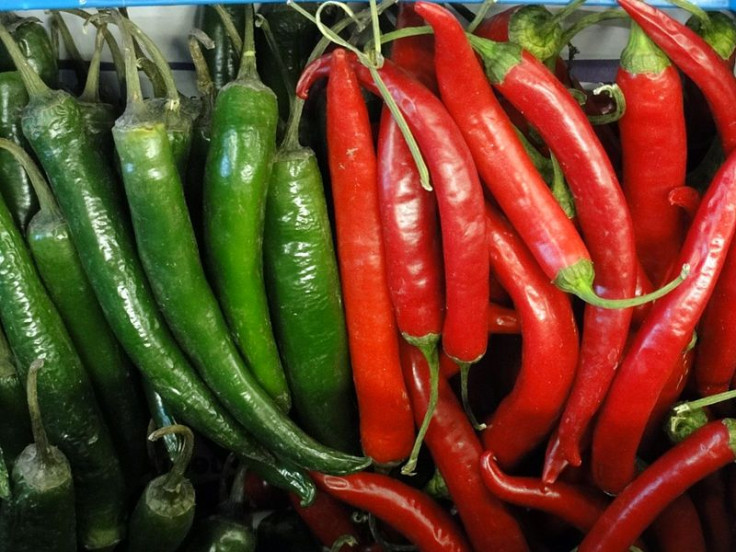Enjoying Spicy Food Is About Seeking Sensations, Not Desensitization To The Spice

Not everyone likes spicy foods. In fact, some people have a complete aversion to it. But why is it that certain others will go out of their way to eat such painful foods? A new study, which was presented at the 2013 Institute of Food Technologists (IFT) Annual Meeting and Food Expo, found that the answer could lie in people's personalities, particularly in those who are sensation seekers.
Nadia Byrnes, a doctoral candidate at Penn State University and lead researcher of the study, assessed a group of 184 participants, between the ages of 18 and 45, using the Arnett Inventory of Sensation Seeking (AISS) test. Participants were able to rate their inclination to engage in novel and intense situations, which then determined their risk preferences. For example, a novel situation would have included, "I can see how it would be interesting to marry someone from a foreign country," while an intense situation would have been "When I listen to music, I like it to be loud."
Those who were in a group that scored higher than the average AISS score were considered to be more open to risky situations and new experiences, while those scoring below were considered to be less open to such experiences.
The participants were than given 25 micrometers of capsaicin — the spicy component in chili peppers — in their meals, and told to rate how much they enjoyed their meal as time passed and the burn became more intense. The researchers found that as the burn became more intense, those who scored under the average AISS score quickly began to dislike the food, while those who scored above it liked the food - even as its intensity increased. Those who scored near the average score also began to dislike the food but not as quickly as those below the average.
"Theoretically, we know that burn intensity and liking are linear related. The more irritating a compound or food gets, the less people should like it," Byrnes said in a statement. "But that's not always the case."
Brynes also authored a similar study in which 97 people were tested on the AISS, and then asked to complete a questionnaire rating the intensity of sensations after sampling six stimuli, including capsaicin mixed with water. Then, later on, they completed surveys about how often they ate spicy foods, Popular Science reported.
Byrnes found that sensation seeking was just as much a prevalent factor in this study. However, she also found that that people who ate spicy food still felt the burn of the food just as much as those who ate spicy food less often. She says the study group may not have been large enough to determine this factor.
"No one knows the capsaicin dose or dosing frequency required in the diet to induce desensitization," John E. Haynes, a co-author of the study, said. Ultimately, Hayes says there are a number of factors that contribute to a person's inclination to eat spicy food.
"Certainly, prior experience, childhood exposure, and learning all play a critical role in liking for spicy foods," Hayes said, "however, there are also individuals who acquired an entirely [new] set of food preferences as adults once they moved away from home. It seems plausible that personality differences may be a major factor in this sort of exploration and learning."
Source:
Byrnes N, Hayes J. Personality factors predict spicy food liking and intake. Food Quality and Preference. 2013.



























